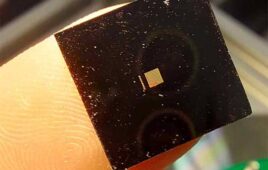
Abiomed Impella 2.5 (Image from Abiomed)
New data on Abiomed (NSDQ:ABMD) Impella heart pumps show a 34% increase in survival among nearly 5,000 patients treated with the company’s devices intended to treat cardiogenic shock when combined with best practices, according to a company study.
The study of patients treated at 763 U.S. sites between April 1, 2018 and March 28, 2019 showed median survival rates had risen from 51% in 2016, when the FDA granted premarket approval for the Impella 2.5, CP, 5.0 and LD heart pumps, to 67%, the Danvers, Mass.-based company said. (The FDA approved Impella 2.5 for high-risk cardiogenic shock patients in March 2015.)
Since FDA approval, Abiomed has collected data on nearly 100% of U.S. Impella patients in its Impella quality assurance database, the company noted. This clinical data, combined with the FDA post-approval studies embedded in Abiomed’s prospective central ventricular access device (cVAD) study, helped identify and validate best practices for Impella use associated with improved survival and native heart recovery, according to a statement from Abiomed.
These best practices, including use of Impella pre-percutaneous coronary intervention, reduction of inotropes, early identification of shock, and hemodynamic monitoring with pulmonary artery catheters, have been validated in studies published in several journals, including the Journal of Interventional Cardiology (2014), the American Journal of Cardiology (2017), the Journal of Interventional Cardiology (2017), the American Heart Journal (2018), the Journal of the American College of Cardiology (2018) and Circulation (2018). Data from the first 104 patients utilizing best practices in the National Cardiogenic Shock Initiative Study presented at TCT 2018 showed 77% survival to discharge with 99% native heart recovery.
An observational study of 204 patients admitted to Inova Heart and Vascular Institute suggested that a standardized, team-based approach may improve cardiogenic shock outcomes. Published online this week in the Journal of the American College of Cardiology, the study indicated that including the early use of percutaneous mechanical circulatory support as part of a best practice protocol revealed improved acute cardiomyopathy infarction-associated cardiogenic shock survival at 30 days rose from 44% to 82%.
“The totality of the data on Impella use for cardiogenic shock demonstrates that coordinated care with a multidisciplinary team-based approach, a standardized protocol, and the best available tools, can lead to a remarkable increase in survival,” said Dr. William O’Neill, medical director of the Center for Structural Heart Disease at Henry Ford Hospital in Detroit, in a statement from Abiomed. “This gives us hope for making real improvements to patient outcomes in this patient population that has historically been difficult to treat.”
“Abiomed has built the field of heart recovery by partnering with our hospitals and physicians to use real-world data, combined with FDA post-approval studies, to identify and validate best practices to improve patient outcomes,” added Abiomed president & CEO Michael Minogue. “It is inspiring that, over the last three years, cardiogenic shock patients have returned home to their families with their native heart.”
The latest study comes on the heels of the FDA’s February announcement that interim results of a post-approval study of Abiomed‘s Impella RP heart pump system showed only a 17.4% survival rate, approximately 55% lower than the rate noted in the premarket study of the device. The post-approval study had 23 patients at the time of the FDA announcement. It is slated to follow 60 patients through to one year, have a similar primary endpoint of survival to 30 days post-explant, hospital discharge or the start of longer-term therapy.
Upon analyzing the interim data, Abiomed said that the higher mortality rate may be primarily due to differences in pre-implant characteristics of patients, as 16 of the 23 patients in the post-approval study would “not have met the enrollment criteria for the premarket clinical studies,” according to the FDA.




